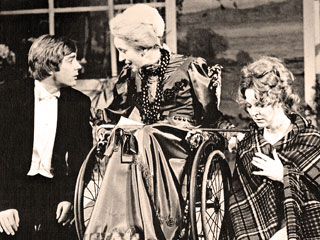Theaterweek
by Anthony Chase
"Six Degrees of Separation” is an easy game for those who have worked in the theater. Eventually, it seems, every actor has worked with somebody who has worked with every other actor. When Liz Hiller died on March 3, 2008 at the age of 82, Buffalo lost an important connection to its theatrical past.

From the time she and her husband, the late Lejaren Hiller, Jr., moved to Buffalo in 1968, Liz Hiller worked regularly as an actress and director in the local theater community. These were formative years in developing the vital theater scene we enjoy here to this day. Hiller worked with the Buffalo Theatre Workshop and The Playhouse, and was also seen at Studio Arena Theatre and eventually at the Irish Classical Theatre.
The work done at local theaters during these years was often ambitious and notable for its literary merit. As a director, actress Joan Calkin recalls that she and Tess Spangler appeared in Henrick Ibsen’s Little Eyolf up at the Keenan Center in Lockport under Hiller’s direction and that Hiller also directed Brian LaTulip in Samuel Beckett’s Krapp’s Last Tape. She recalled, as well, taking on work by Jean Cocteau. As an actress, Hiller displayed an impressive range, though late in her career she was often featured as women of refinement or grand dames. She played Mary Tyrone in Eugene O’Neill’s Long Day’s Journey Into Night, Lady Bracknell in Oscar Wilde’s The Importance of Being Earnest and the aristocratic and wheelchair-bound Mme. Desmermortes in Jean Anouilh’s Ring Round the Moon. She appeared in Ivan Turgenev’s A Month in the Country.
Though she relocated to Saratoga Springs in 2002, upon her death a generation of Buffalo actors mourned her loss with great immediacy and affection—Brian LaTulip, Tess Spangler, Joan Calkin and others who had known her back in the day had grown to depend upon her friendship and insight.
A remarkably elegant and refined woman with a keen intellect and marvelously astute wit, Hiller also enjoyed the deployment of a bawdy double-entendre if the moment seemed to warrant it. Her twinkling eye would give her away as she warmly took in her unsuspecting dupe and unleashed an unexpected zinger. Calkin recalled that Hiller took on the role of angel protector to all her friends. She would be the one to arrive with food when you were sick, or who would, without being asked, rent you a car after yours had been totaled. She continued to inquire after the well-being of those she loved up until the time of her death.
Born Elizabeth Halsey in New Jersey in 1925, Hiller grew up in Manhattan to a life of privilege that served to heighten her sensitivity to the disadvantaged. She was well educated, first at the prestigious Nightingale-Bamford School for girls (at a time when Frances Nightingale and Maya Bamford still ran it), and then at the University of Illinois at Champaign-Urbana. In 1945, she married Lejaren (Jerry) Hiller, Jr., who would become internationally celebrated as a pioneering composer of computer music. Together, they raised a daughter, Amanda, and a son, David. Jerry Hiller retired from the UB faculty in 1989 and died in 1994.
The work of the Liz Hiller generation represented a golden age of Buffalo theater and a legacy to our region. Even the most inexperienced newcomer owes a debt to Hiller and her contemporaries, and we should all mourn her passing.
|
Issue Navigation> Issue Index > v7n11: Public Enemy's Professor Griff (3/13/08) > Theaterweek This Week's Issue • Artvoice Daily • Artvoice TV • Events Calendar • Classifieds |









 Current Issue
Current Issue